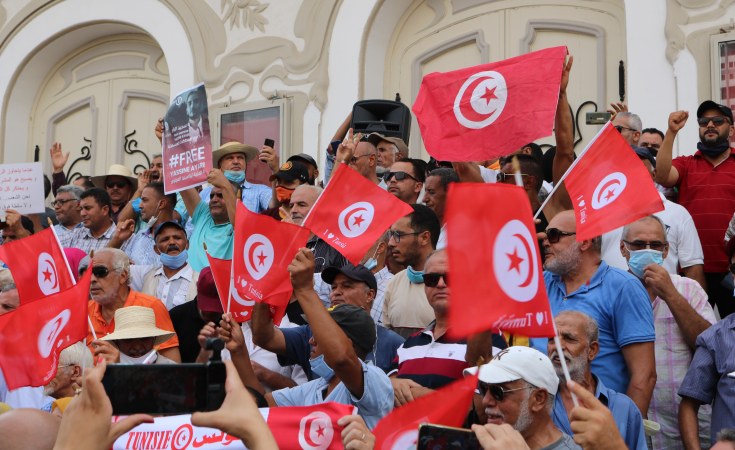Protesters from opposition groups called on the president to step down. President Saied's 2021 power grab has sounded the alarm in what was seen as the Arab Spring's only democracy.
Thousands of Tunisians who oppose sitting President Kais Saied voiced their frustration with his rule on Saturday as they took to the central streets of the capital to mark the 12th anniversary of the country's uprising that launched the Arab Spring revolutions.
Protests against the autocratic regime of former President Zine el-Abidine Ben Ali were crowned on January 14, 2011, by his ouster, as he fled the country on the same day and ushered in a new era.
The protests sparked a wave of similar movements in the Arab World. But for years, Tunisia seemed to be the only country that enjoyed a democratic system since the Arab Spring.
However, in July 2021, law professor-turned-President Kais Saied suspended the constitution and parliament, casting aside the Islamist Ennahda party and paving the way for a new constitution that expanded the powers of the president at the expense of parliament.
Who joined the anniversary protests?
Saturday's protests were mainly organized by the country's biggest opposition movement, the National Salvation Front (FSN). The group's main component is the Islamist Ennahda party, which is considered Saied's nemesis.
Protests were primarily centered in the Habib Bourguiba Avenue in central Tunis. Protesters waved the country's flag and revived 2011 chants, including: "down with Saeid," and "the people demand the fall of the regime."
"Tunisia is going through the most dangerous time in its history. Saied took control of all authority and struck at democracy. The economy is collapsing. We will not be silent," Reuters cited one protester, 34-year-old Said Anouar Ali, as saying.
In a statement carried by the state news agency TAP on Friday, the Tunisian Interior Ministry said it had greenlighted protests in the Habib Bourguiba Avenue. It called on protesters to steer clear of confrontations with security forces.
Another march was separately organized by the Free Destourian party, another Saied staunch opponent, but one aligned with the pre-2011 regime and equally opposed to Ennahda. Hundreds of protesters joined party leader Abir Moussi in downtown Tunis after being banned from marching to the presidential palace in Carthage.
Moussi called for Saied's resignation while addressing the crowd, blaming the president and his administration for the economic crisis.
What is happening to Tunisia's economy?
Some of those who had initially supported Saied's moves in 2021 have today turned against him, as biting shortages affect different households.
The democratic reforms the country witnessed during the decade following the uprising were coupled with a hit to its economy.
The economy continued to deteriorate after 2021, with inflation passing the 10% mark in December 2022, and poverty affecting some 20% of the country's 12 million people.
Tunisian residents have also been suffering from shortages of staple items such as sugar, milk and oil.
"The coup has brought us famine and poverty. Yesterday the grocer gave me just one kilo of macaroni and a can of milk," Nouha, a woman at the Habib Bourguiba protest, told the French AFP news agency on Saturday.
Unemployment has also exceeded 15%, in a country where most job opportunities are still offered by the state. Protesters also chanted for "work" or job opportunities on Saturday.
The government of Saied has been scrambling to secure a $1.9 billion (€1.75 billion) loan from the International Monetary Fund.
However, IMF demands to lift food and energy subsidies and restructure public firms have stood in the way of securing the funds since the politically sensitive prerequisites could further slump Saied's popularity and stir further opposition against his government.
rmt/sms (AFP, Reuters)


